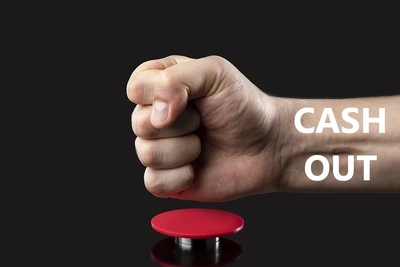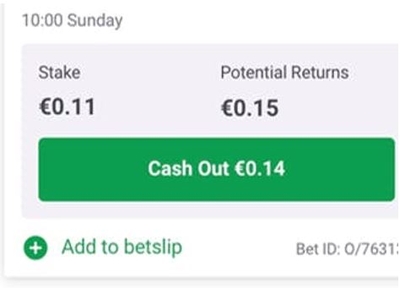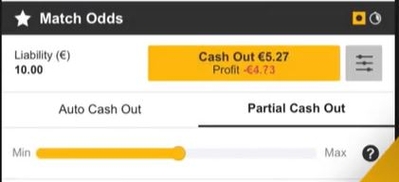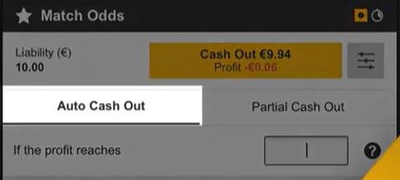Due to high levels of demand, cash out is now a feature that you will find at most online bookmakers. It was something first pioneered by Betfair during the rise of in-play betting and many competitors quickly followed with their own versions.
Now widely adopted, most punters have the option to cash out their bets and many take advantage of this ability. Should you ever wish to do the same, keep reading this cash out guide to find out how it works.
What is Cash Out?
 Before explaining how to cash out a bet, it is worth mentioning what the term means.
Before explaining how to cash out a bet, it is worth mentioning what the term means.
Cashing out is something that enables a punter to settle a bet early, rather than waiting for it to run its full course.
To keep it simple, imagine you bet £10 on Fulham to beat Everton at 3/1 odds. If Fulham were 1-0 up after 70 minutes but looking extremely shaky, you might decide you want to cash out.
At this stage in the game, the bookmaker may offer you a cash out price of £25 (this includes your stake). If you accept, the bet is over and the £25 will be yours, then and there. It does not matter what happens in the game after this point as you have settled your wager.
The downside is though, that should Fulham hold on, you have lost out on some potential winnings.
| – | No cash out | Cash out |
|---|---|---|
| Fulham win | £40 | £25 |
| Fulham don’t win | £0 | £25 |
The live odds at the time impact the amount that the bookmaker offers as the cash out price.
If Fulham were leading 2-0, or there were just a few minutes of the game remaining, the cash out price would be higher whereas it would be much lower if the score was 0-0.
It is worth noting that the cash out price can be lower than your original stake, when a bet is going badly, enabling customers to take a reduced loss of their stake rather than losing the lot.
How to Cash Out
We consider there to be three main steps when cashing out a bet, which are as follows:
1. Place an Eligible Bet
It goes without saying that to be able to cash out a bet, you need to place your bet at a bookmaker that offers the feature.
There is more to it than this though as no matter where you bet, not all markets offered can be cashed out.
In the example below, the -1 handicap markets are cash-back eligible but draw no bet is not.

There are a couple of key points to be aware of at this stage. One is that different bookmakers have different rules over which markets they allow cash out for. There are some common rules but do not automatically assume that just because one has cash out for a market that the rest will do. Secondly, be aware that not all bookies display cash-out eligible markets like this. Some state on the betting slip whether you will have the cash out option or not.
Typically, most bookmakers allow cash out for single or multiple bets. So, in other words, any bet with just one stake. This is providing that all selections on the betting slip are eligible for cash out. It is not as widely available for system bets so you will need to check the rules beforehand if you tend to make such wagers.
Finally, be aware that it is not unusual for bets made using a free bet to not have the cash out option. For bookmakers that do support this, any cash out offer will not take into account the value of the free bet itself.
2. Wait For the Right Time
 The key to cashing out is doing it at the right time. This is not an easy skill to acquire but it is something you can get better at over time. The more sporting events you have bet on that are happening simultaneously, the harder it is to pull the trigger at the right time. If you placed just a single bet, you would be able to watch the game and/or keep tabs on live stats to help give you a very informed opinion.
The key to cashing out is doing it at the right time. This is not an easy skill to acquire but it is something you can get better at over time. The more sporting events you have bet on that are happening simultaneously, the harder it is to pull the trigger at the right time. If you placed just a single bet, you would be able to watch the game and/or keep tabs on live stats to help give you a very informed opinion.
Regardless of what your bet looks like though, there are two common moments when punters do opt to take a cash out offer. One is when the tide looks like it is beginning to turn against their bet. They think their bet will end up as a loser so they want to cash in now, while they can still get some money back. If you bet on a player to win a tennis match but they are looking increasingly tired, or showing signs of an injury, this might be an appealing time to cash out.
The other common time to cash out is not in response to in-play action, but rather simply a matter of nerve. Imagine if you had bet on four consecutive horse races at Cheltenham, and the first three have ended up as winners. If you had the least amount of confidence in the final selection you might decide it is better to quit while you are ahead. After all, you have the chance to lock in a nice amount so why risk losing it all for a shot at an even bigger payout?
When considering a cash out in between events, you have the benefit of having more time to mull over your decision. It is possible that the cash out price may change a little, as pre-event odds fluctuations do occur, but the change will be fairly minimal. The same might apply at half time in a game of football, lunch in the cricket, or just during a break in play in certain sports.
When cashing out a live bet though, you must often make a very quick call because the price offered is so much more volatile. Going back to our first example of Fulham versus Everton, if you held-off cashing out at £25 and the Toffees managed to find an equaliser in the 78th minute, you might be looking at a new cash out price of around £5.
3. Confirm the Cash Out
 Whenever you have decided the time is right, you just need to make it official. Bookmakers operate in slightly different ways of course but generally, if you navigate to ‘my bets’ or ‘my open bets’ you will find your active wagers. For all those that are cash-out eligible you should find a button beside it indicating the cash out price.
Whenever you have decided the time is right, you just need to make it official. Bookmakers operate in slightly different ways of course but generally, if you navigate to ‘my bets’ or ‘my open bets’ you will find your active wagers. For all those that are cash-out eligible you should find a button beside it indicating the cash out price.
To reduce the chance of accidents occurring, bookmakers will usually ask you to confirm the cash out before processing it. Therefore, the process typically requires two clicks or taps rather than just one. Once approved, and this is something that should only take a few seconds, your bookmaker will add the funds to your account balance.
It can happen that when you go to cash out, rather than a price, you will see a box that says ‘cash out suspended’ or similar. This usually occurs when the bookmaker has suspended the live odds for a match, or at least for the market you have bet on. They often do this when a significant moment has occurred such as a goal, penalty or a red card review, because these will (potentially) impact the available odds.
Market suspensions do not remain for too long though so give it a short amount of time and the cash out price should appear again. It may be lower or higher than it was pre-suspension, depending on what happened during that time though.
Auto and Partial Cash Out
The above guide covers all the fundamentals of a standard, full, cash out but some bookmakers have two extra options available.
Partial Cash Out
 With a regular cash out, you will settle the entire bet early, leaving no part of it active.
With a regular cash out, you will settle the entire bet early, leaving no part of it active.
With a partial cash out, however, you can settle a portion of the wager, while letting the rest of it run as normal.
Say you made a £10 bet on a cricket match, you could decide to cash out half of it (at half the offered cash out price) while keeping £5 on the event at the original odds.
For bookmakers that offer this feature, they usually have a slider by the cash out price.
Users just adjust this slider to indicate what portion of the bet they wish to settle early.
They then confirm it just as they would with a normal cash out.
Auto Cash Out
 With this handy feature, you do not have to take an active role when cashing out your bets.
With this handy feature, you do not have to take an active role when cashing out your bets.
After placing your wager you can instead simply set up a cash out ‘rule’ that will apply automatically.
Typically, how this works is that you will state that you would like your bet cashing out should the cash out value reach a stated amount, for example £15.
Some bookmakers even enable customers to set up auto cash outs so only part of the bet is settled when it reaches the specified amount.
